Related Research Articles

The politics of Moldova take place in a framework of a parliamentary representative democratic republic,wherein the prime minister is the head of the Government of Moldova,and a multi-party system. The President of Moldova has no important powers. The government exercises executive power while the legislative power is vested in the Parliament. The judiciary is independent of the executive and the legislature. The position of the breakaway region of Transnistria,relations with Romania and with Russia,and integration into the EU dominate political discussions.
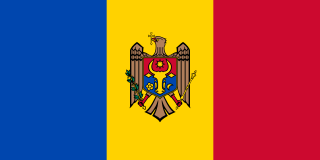
Moldova,officially the Republic of Moldova,is a landlocked country in Eastern Europe,on the northeastern corner of the Balkans. The country spans a total of 33,483 km2 (12,928 sq mi) and has a population of approximately 2.5 million as of January 2023. Moldova is bordered by Romania to the west and Ukraine to the north,east,and south. The unrecognised breakaway state of Transnistria lies across the Dniester river on the country's eastern border with Ukraine. Moldova is a unitary parliamentary representative democratic republic with its capital in Chișinău,the country's largest city and main cultural and commercial centre.
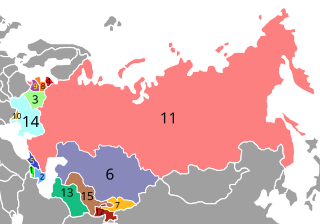
The post-Soviet states,also referred to as the former Soviet Union (FSU) or the former Soviet republics,are the independent sovereign states that emerged/re-emerged from the dissolution of the Soviet Union in 1991. Prior to their independence,they existed as Union Republics,which were the top-level constituents of the Soviet Union. There are 15 post-Soviet states in total:Armenia,Azerbaijan,Belarus,Estonia,Georgia,Kazakhstan,Kyrgyzstan,Latvia,Lithuania,Moldova,Russia,Tajikistan,Turkmenistan,Ukraine,and Uzbekistan. Each of these countries succeeded their respective Union Republics:the Armenian SSR,the Azerbaijan SSR,the Byelorussian SSR,the Estonian SSR,the Georgian SSR,the Kazakh SSR,the Kirghiz SSR,the Latvian SSR,the Lithuanian SSR,the Moldavian SSR,the Russian SFSR,the Tajik SSR,the Turkmen SSR,the Ukrainian SSR,and the Uzbek SSR. In Russia,the term "near abroad" is sometimes used to refer to the post-Soviet states other than Russia.

The prime minister of Moldova is Moldova's head of government. The prime minister is formally appointed by the president of Moldova and exercises executive power along with the cabinet,subject to parliamentary support. Dorin Recean has been serving as prime minister since 16 February 2023 following the dissolution of the Gavrilița cabinet which took place during the same month.
An energy minister is a position in many governments responsible for energy production and regulation,developing governmental energy policy,scientific research,and natural resources conservation. In some countries,environmental responsibilities are given to a separate environment minister.
The Cabinet of Moldova is the chief executive body of the Government of Moldova. Its function according to the Constitution of Moldova is "to carry out the domestic and foreign policy of the State and to apply general control over the work of public administration".

Moldovan-Spanish relations are foreign relations between Spain and Moldova. On 30 January 1992 Spain established diplomatic relations with Moldova. As of 2009 Spain does not have an embassy in Chişinău. Spain is represented in Moldova via its embassy in Bucharest in Romania.

The First Filat Cabinet was the Cabinet of Moldova between September 25,2009,and January 14,2011. It was a caretaker cabinet from the election of November 28,2010,until it was succeeded by the Second Filat Cabinet on January 14,2011.

Gheorghe Șalaru is a Moldovan politician. He was the Environment Minister in the First Vlad Filat Cabinet and in the Second Filat Cabinet.
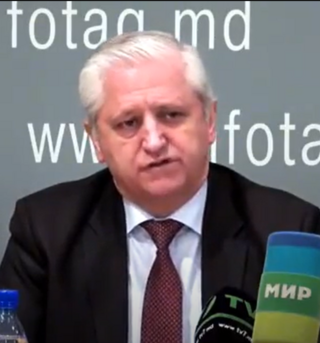
Valeriu Cosarciuc is a Moldovan politician,who served as Deputy Prime Minister in the Dumitru BraghișCabinet,coordinating the government's activities in the field of industry,energy,agriculture,communications and the environment. He was the Minister of Agriculture and Food Industry in the First Vlad Filat Cabinet. He is a member of the Party Alliance Our Moldova.
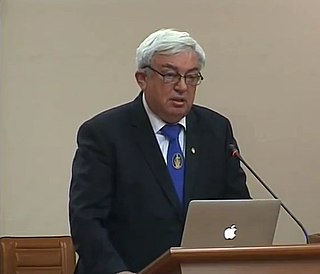
Gheorghe Duca is a Moldovan academic and politician who is a former president of the Academy of Sciences of Moldova,an honorary member of the Romanian Academy,and former Moldovan Minister of Environment,Public Works and Regional Development.

Denmark –Moldova relations refers to the current and historical relations between Denmark and Moldova. Neither country has a resident ambassador. The Moldovan Ambassador to Denmark is Igor Corman,who resides in Berlin and was appointed in 2005. The Danish Ambassador in Moldova is Ole Harald Lisborg,who resides in Bucharest. Denmark is a member of the European Union,which Moldova applied for in 2022. Both countries are full members of Council of Europe.
A ministry of energy or department of energy is a government department in some countries that typically oversees the production of fuel and electricity;in the United States,however,it manages nuclear weapons development and conducts energy-related research and development. The person in charge of such a department is usually known as a minister of energy or minister for energy.

The Second Filat Cabinet was the Cabinet of Moldova from 14 January 2011 to 30 May 2013. The Cabinet consisted of ministers from the Liberal Democratic Party of Moldova,the Democratic Party of Moldova,and the Liberal Party,who together formed the Alliance for European Integration. It was the second government to be led by Vlad Filat who was prime minister from 2009 until 2013. The Cabinet was installed after a successful vote of confidence held in the Parliament of Moldova on 14 January 2011.
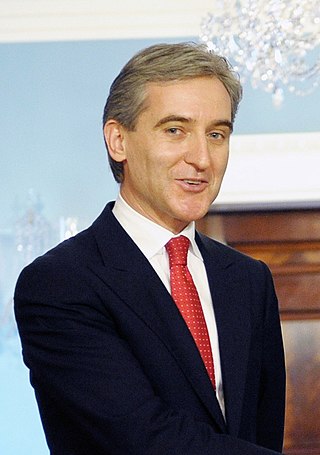
The LeancăCabinet was the Cabinet of Moldova from 30 May 2013 to 18 February 2015. The Cabinet consisted of ministers from the Liberal Democratic Party (PLDM),the Democratic Party (PDM),and the Liberal Reformist Party (PLR),a splinter group from the Liberal Party (PL),who together formed the Pro-European Coalition. The Cabinet was installed after a successful vote of confidence held in the Parliament of Moldova on May 30,2013.

Maia Sandu is a Moldovan politician who has been the President of Moldova since 24 December 2020. She is the founder and former leader of the Party of Action and Solidarity (PAS) and former Prime Minister of Moldova from 8 June 2019 until 14 November 2019,when the government collapsed after a vote of no-confidence. Sandu was Minister of Education from 2012 to 2015 and member of the Parliament of Moldova from 2014 to 2015,and again in 2019.

The First Tarlev Cabinet was the Cabinet of Moldova from 19 April 2001 to 19 April 2005. It was the first government led by Vasile Tarlev who was the Prime Minister of Moldova from 2001 to 2008.
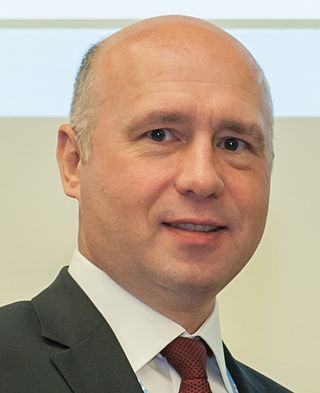
The Filip Cabinet was the Cabinet of Moldova led by Pavel Filip from January 2016 to June 2019.

The Gavrilița Cabinet was the Cabinet of Moldova,led by former Finance Minister Natalia Gavrilița from 6 August 2021 until 16 February 2023.

Iuliana Cantaragiu was the Minister of Environment of the Republic of Moldova.
References
- ↑ "Moldovan government appointed new ambassadors and officials". Government of Moldova.
- ↑ "Moldovan environment minister meets Romanian counterpart in Bucharest". Moldpress.